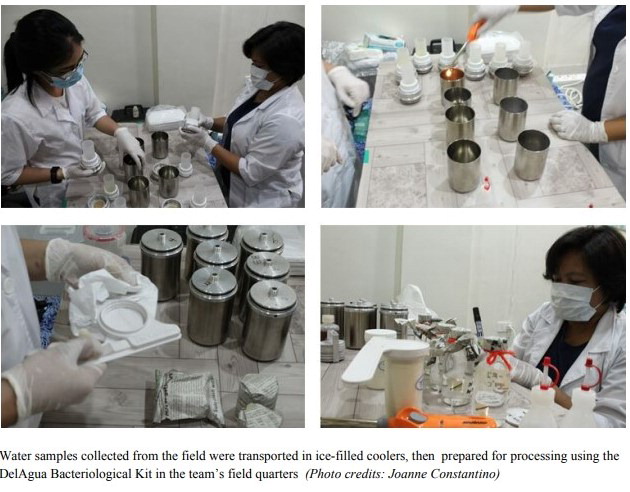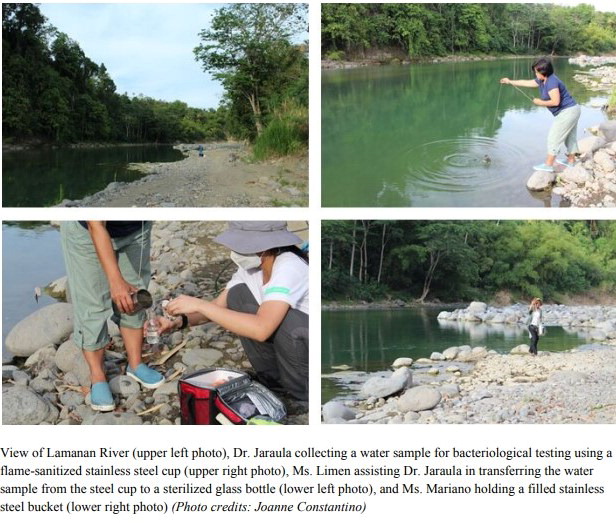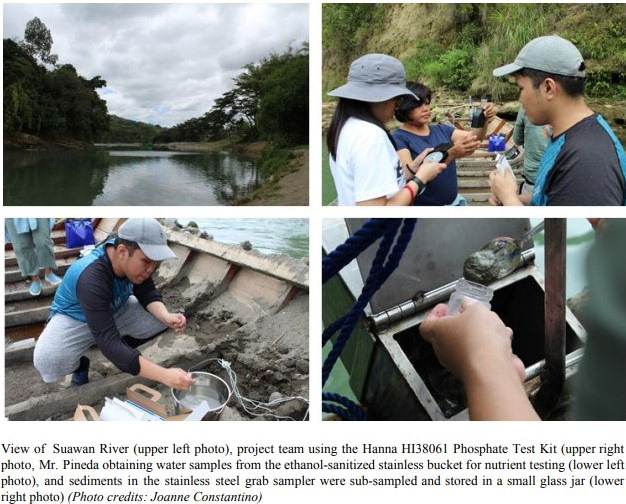|
Cycle 7 (2018 Deadline)
Baselining persistent and emerging organic pollutant levels in environmental and engineered systems (PEOPLES) for healthy Philippines
PI: Caroline Jaraula (cjaraula@msi.upd.edu.ph), Marine Science Institute, University of the Philippines
U.S. Partner: Diana Aga, Institute of Chemistry, University at Buffalo, State University of New York
Project dates: November 2018 - December 2021
Project Overview
Working in partnership with the NSF-supported Halting Environmental Antimicrobial Resistance Dissemination (HEARD PIRE) project, this study helped lay the foundation for environmental monitoring of antibiotics in the Philippines. The overall goal of this PEER project was to increase the number of wastewater treatment plants in the Philippines sampled for antibiotics, then expand that sampling to point sources, as well as receiving river and marine environments. This research project provided baseline information on effluents so that proper government policies and community action can be implemented to quantify and manage these challenges. The data collected were used to identify critical areas to prioritize for a combined engineered and natural wastewater plan useful for local governments and organizations to leverage further detailed planning and application for business-government partnerships.
The researchers sought to consolidate watershed and basin information into a map focusing on land use and locations of point sources in the study areas, collecting data on current and planned wastewater treatments. They also determined antibiotic types and concentrations in wastewater treatment plants and in terrestrial and marine environments of Davao, Manila, and Cagayan de Oro, Philippines, as well as pesticides in the watershed and coastal areas of the target sites.
Final Summary of Project Activities
The PI Dr. Caroline Jaraula and her team produced a map of Davao City and Cagayan de Oro in which farms and hospitals were plotted with the help of data acquired from relevant agencies and local government units. The project’s sampling campaign tested a variety of sites for the target effluents and antibiotic-resistant genes. Among their findings were the identification of pharmaceutical metabolites and personal care product residues from upstream, influent, and effluent wastewater treatment plant samples from Metro Manila and Laguna, as well as Davao River Basin, Cagayan River Basin, and public and private Cagayan de Oro hospitals. A total of 157 compounds comprising antibiotics, antifungal compounds, anticonvulsants, antihypertensive drugs, pesticides, and industrial chemicals were identified in Angeles. Four antibiotic-resistant genes were detected in all of the sites from the Davao river basin, while all 11 of the targeted antibiotic-resistant genes were detected in four study sites in Lumaba. All told, the team undertook statistical analyses of five years of water quality parameters from the Davao River, as well as measuring levels of SARS-CoV2 at sampling sites in November 2020.
PEER project members presented their work at a variety of conferences and published several academic articles. They also met with local government officials to discuss emerging and persistent pollutants and possible ways forward in research and policy.
The project supported the training and research for several graduate and undergraduate students and strengthened the skills of local researchers and educators through several capacity-building activities. These included laboratory processing training conducted both at the University of the Philippines Diliman and the University at Buffalo, SUNY, as well as hands-on sample collection training for three faculty members from the Philippine Science High School during the Davao Gulf fieldwork.
Publications
Shyrill Mae F. Mariano, Luisa F. Angeles, Diana S. Aga, Cesar L. Villanoy, and Caroline Marie B. Jaraula. 2023. Emerging pharmaceutical contaminants in key aquatic environments of the Philippines. Frontiers in Earth Science 11:1124313. https://doi.org/10.3389/feart.2023.1124313
Maria Catherine B. Otero, Lyre Anni E. Murao, Mary Antoinette G. Limen, Daniel Rev A. Caalim, Paul Lorenzo A. Gaite, Michael G. Bacus, Joan T. Acaso, Refeim M. Miguel, Kahlil Corazo, Ineke E. Knot, Homer Sajonia II, Francis L. de los Reyes III, Caroline Marie B. Jaraula, Emmanuel S. Baja, and Dann Marie N. Del Mundo. 2022. Multifaceted assessment of wastewater-based epidemiology for SARS-CoV-2 in selected urban communities in Davao City, Philippines: a pilot study. International Journal of Environmental Research and Public Health 19(14): 8789. https://doi.org/10.3390/ijerph19148789
Luisa F. Angeles, Lahiruni M. Halwatura, Jonathan P. Antle, Scott Simpson, Caroline M.B. Jaraula, and Diana S. Aga. 2021. In silico supported nontarget analysis of contaminants of emerging concern: increasing confidence in unknown identification in wastewater and surface waters. ACS ES&T Water 1: 1765-1775. https://doi.org/10.1021/acsestwater.1c00105
Randolph R. Singh, Luisa F. Angeles, Deena M. Butryn, Jacob W. Metch, Emily Garner, Peter J. Vikesland, and Diana S. Aga. 2019. Towards a harmonized method for the global reconnaissance of multi-class antimicrobials and other pharmaceuticals in wastewater and receiving surface waters. Environment International 124(2019: 361–369. https://doi.org/10.1016/j.envint.2019.01.025
Back to PEER Cycle 7 Grant Recipients
|
|
|
|






